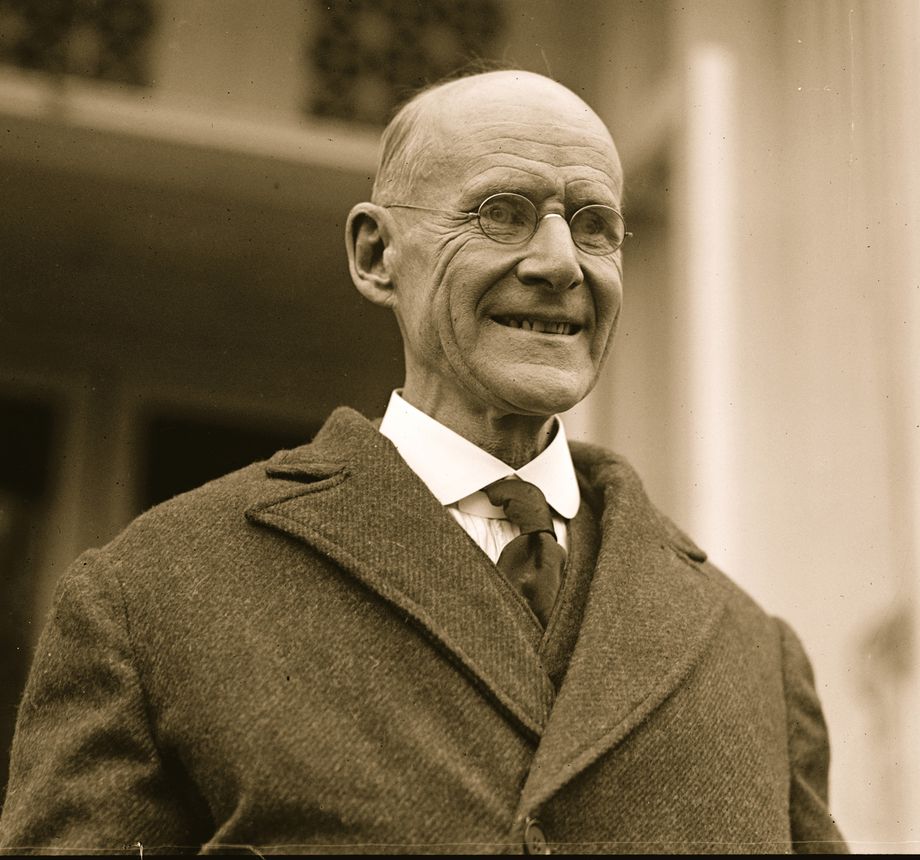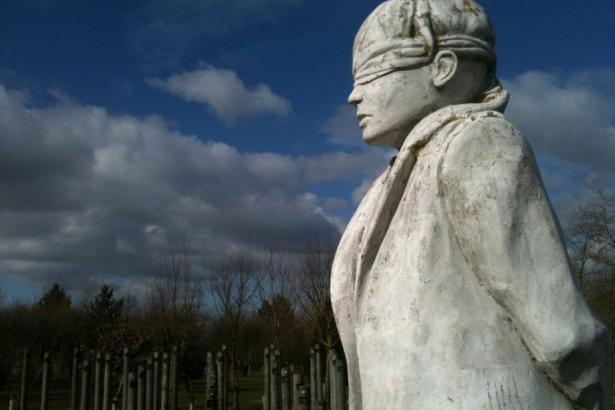Memorial Day and Veterans Day often get equated, but there is an essential distinction between the two. Veterans Day honors all who have served the American military in wars. Memorial Day honors those who've perished. It's an annual reminder that wars have grave human costs, which must be both recognized and minimized.
Those costs are not inevitable. We ought to also set aside time to remember those throughout American history who have tried hardest to reduce them, to prevent unnecessary loss of life both American and foreign: war resisters.
War resistors can be heroes

Eugene V. Debs, who went to jail for opposing World War I. (Buyenlarge/Getty Images)
American history is littered with examples of pointless wars fought for bad reasons, and with people who risked their careers and their freedom to oppose them. The Mexican-American War, for one, was a blatant land grab. While James K. Polk claimed that Mexico had struck first — saying in his war message to Congress that "Mexico has passed the boundary of the United States, has invaded our territory and shed American blood upon America's soil" — the truth was that he had sent American troops into disputed territory between the Rio Grande and the Nueces River, whereupon Mexican troops, concerned by American encroachment, attacked.
World War I was, if anything, more pointless than the Mexican-American War. The best that could be said of American involvement in the conflict is that it helped bring seemingly ceaseless bloodshed between European nations to a quicker close. But the war itself was fought for no great principle. It was not a fight against tyranny; Germany was a constitutional monarchy, much like Great Britain, and the Allies counted Czarist Russia among their ranks. It was not redressing any unprovoked invasion. It was a tragic unfurling of alliances that claimed 10 million lives and laid the groundwork for both Stalinism and Nazism.
And for the crime of opposing US entry into that morass, dozens saw federal prison time, mostly under the Espionage Act of 1917. In World War I alone, socialist leader Eugene V. Debs, Rep. Victor Berger (socialist-WI), Jehovah's Witnesses leader Joseph Franklin Rutherford, activist Kate Richards O'Hare, anarchist Emma Goldman, and German-American businessman William Edenborn all served time behind bars for their opposition to the war. Berger was denied his seat in Congress for his conviction, one of the few times a duly elected American politician was barred from office for having the wrong opinions.
Outside the United States, World War I resisters suffered even more. More than 20,000 Britons refused the draft, and of those more than 6,000 were sent to prison and endured "hard labor, a bare-bones diet, and a strict 'rule of silence,'" as the writer Adam Hochschild explains. Those who refused to fight upon making it to the front often faced death. The British and French armies shot 320 and 700 men, respectively, for refusing to kill.
Desertion is an extreme measure, and it's easy to condemn those who resisted in that manner, to claim they were cowards or fell down on their duties to their fellow soldiers. It's easier still to point to wars of more moral clarity — the fight against Nazi and Japanese imperialism in World War II, the destruction of slavery in the Civil War — and ask what conceivable moral point resistance, especially desertion, would have served.
The accomplishment of these war opponents are sometimes hard to identify. The antiwar movements we remember are those tied to wars that were actually fought — that is, to cases where the movements fell short. Debs and Goldman and O'Hare could not stop American involvement in World War I. Their intellectual descendants couldn't keep the US from escalating in Vietnam or invading Iraq.
But one can still find cases when antiwar sentiment helped prevent a calamitous military action. Public aversion to war helped prevent the Oregon boundary dispute ("Fifty-four forty or fight!") from turning into an all-out war with Britain. Antiwar sentiment kept the US out in the early years of World War I, and helped force the Mexican-American War to a speedy resolution. Exhaustion with military intervention in the wake of Iraq has helped ensure a peaceful resolution to the nuclear dispute with Iran of recent years.
These weren't solely the result of principled antiwar efforts. In the Oregon case, for example, opposition arose as much from Southerners opposed to the acquisition of more free territory as from anything else. But insofar as the organized antiwar movement did contribute to public opinion in those cases, it saved lives and demands recognition. And those cases where war opponents failed deserve remembrance as a reminder that the mayhem of a pointless war isn't inevitable, that at least some present at the time were fighting to stop it.
Some countries honor their war resistors
Other countries have started to recognize this and honor their war resisters accordingly. A memorial in Glasgow, Scotland — a hotbed of British antiwar sentiment during World War I — commemorates "those who opposed World War One in order to challenge the purpose of the war and the waste of lives." Monuments in Ypres, Belgium, and Alrewas, England, honor those World War I soldiers who, due both to disillusionment and sheer terror, deserted rather than continue killing in an unjust war. An official monument to Austrian deserters of World War II was unveiled in Vienna last year. The sculptor Mehmet Aksoy's Monument to the Unknown Deserters of Both World Wars, debuted in West Germany in 1989, honors "the man who refused to kill his fellow man."
The US is a long way away from accepting, say, a memorial for those who deserted the military or dodged the draft during Vietnam. Merely deciding to spare them prosecution was controversial enough — and their counterparts from Iraq and Afghanistan still face the possibility of jail time for refusing to kill. Even the more modest step of honoring those who tried to stop war through peaceful means — organized protest, tax evasion, other forms of civil disobedience —would likely be a tall order. The Vietnam War Memorial faced tremendous opposition upon its unveiling for not being an uncritical celebration of the conflict.
But some wars aren't worth fighting. Some causes aren't worth sacrificing American lives for. Those who've fought to remind the government of those basic facts deserve our respect and our thanks.


Spread the word